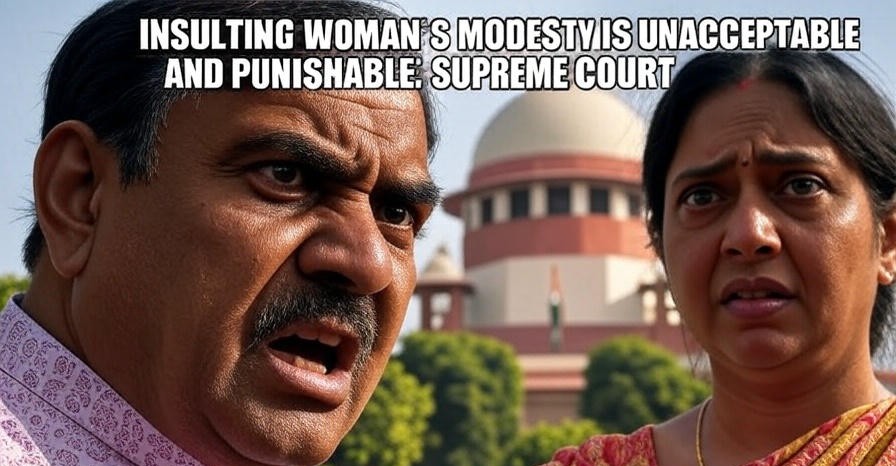INTRODUCTION
A guy was found guilty of insulting a woman’s modesty under IPC Section 509 by a Delhi court. According to the court, his remarks defamed her reputation by implying that she was promiscuous. On May 24, a Delhi local court convicted a man of using derogatory language that cast doubt on a woman’s character in order to offend her modesty. Judicial Magistrate Karanbir Singh heard the case and rendered a decision on May 17.
The legal parts pertaining to this specific offense and the case history will be carefully examined in this essay.
CASE HISTORY
Section 509 of the Indian Penal Code (IPC) was utilized to record a case against the accused, Hemant, also known as Jeet, at the Timarpur police station.
Anyone who intentionally offends a woman’s modesty through words, gestures, or actions is subject to punishment under this rule.
The accused’s offensive and improper remarks toward the woman were unequivocally declared by the court. These remarks were intended to degrade her dignity by presenting her in a negative light, not only as an accidental insult. According to the ruling, the statements used were not neutral or generic; rather, they attacked the woman’s reputation and had a deeper, more serious significance.
According to the court, the accused’s remarks were meant to suggest that the victim was promiscuous, which placed doubt on her character rather than merely offend her.
This indicates that the accused directly attacked the woman’s modesty and sense of honor by making comments that implied she lacked moral integrity. The case demonstrates how the law and the judiciary take seriously insulting a woman by casting doubt on her character. The court’s thorough findings highlight how crucial it is to uphold women’s dignity and how using such disparaging language might result in legal repercussions. Women are especially protected from such offenses under Section 509 IPC, regardless of whether they take place in public, private, or even online settings. The ruling serves as a warning that there are severe legal repercussions for anyone who makes derogatory remarks or gestures directed against a woman’s character.
SECTION 509 OF IPC
Acts intended to offend a woman’s modesty are illegal under Section 509 of the Indian Penal Code (IPC). This involves using words, making noises or motions, displaying things, or invading a woman’s personal space with the intention of offending her. With the consent of the court, the offense is compoundable, cognizable, and bailable.
Important components of Section 509 IPC:
With the intent to offend modesty:
The fundamental requirement is that the act must be performed specifically with the intention of demeaning a woman’s modesty.
Covered Acts: This involves speaking aloud, making noises or motions, displaying items, or violating someone’s privacy.
Target: A woman must be the intended recipient of the act. The penalty consists of a fine and simple imprisonment for a maximum of three years.
Examples of Acts that fall under Section 509 of the IPC include:
- addressing a woman with offensive or provocative words or actions.
- displaying pornographic items or body parts with the intention of offending a woman.
- violating a woman’s privacy by, for example, seeing her in a private setting.
POPULAR SIMILAR CASES
The Kerala High Court rendered a decision in the case of Abhijeet.J.K. vs. State of Kerala on February 20, 2020, citing 16 earlier cases.
Varinder Kaur vs. The State (Nct Of Delhi) & Anr.: The Delhi High Court rendered a decision in this case on September 21, 2017, citing 24 earlier cases.
Section 509 is also involved in the August 25, 2018, decision in Mange Ram vs. Sushma Yadav & Ors.
CURRENT LEGAL POSITIONS
Section 79 of the Bharatiya Nyay Sanhita (BNS) corresponds to Section 509 of the Indian Penal Code (IPC). The offense of offending a woman’s modesty by words, gestures, or actions is covered in both sections.
BNS 79: Addressing the identical offense of insulting a woman’s modesty, this section is a mirror of IPC 509. It punishes the culprit with a fine, a term of imprisonment that can last up to three years, or both.
CONCLUSION
The Indian Penal Code’s (IPC) Section 509 is significant because it criminalizes actions that are meant to or are likely to offend women’s modesty, protecting their dignity and self-respect. By guaranteeing that women are not subjected to harassment or intimidation, this legislative provision promotes equality and respect in society.
This is why Section 509 is so important:
Preserves the dignity of women:
Offers Legal Remedy: It gives women who are subjected to this kind of harassment a way to pursue justice and restitution through the legal system.
Encourages Equality and Safety: Section 509 helps create a more secure and courteous atmosphere for women in both public and private settings by outlawing such behaviors.
ABOUT THE AUTHOR

SAHIL YADAV, a law student at NLIU Bhopal, is a dedicated and passionate legal writer, who is keen to explore International law, Constitutional Law, Criminal Law, Forensic Psychology and publish research papers and articles on contemporary legal nuances and issues. He is also interested in the intersection of disciplines like history, psychology, political science, philosophy, and sociology with law.

